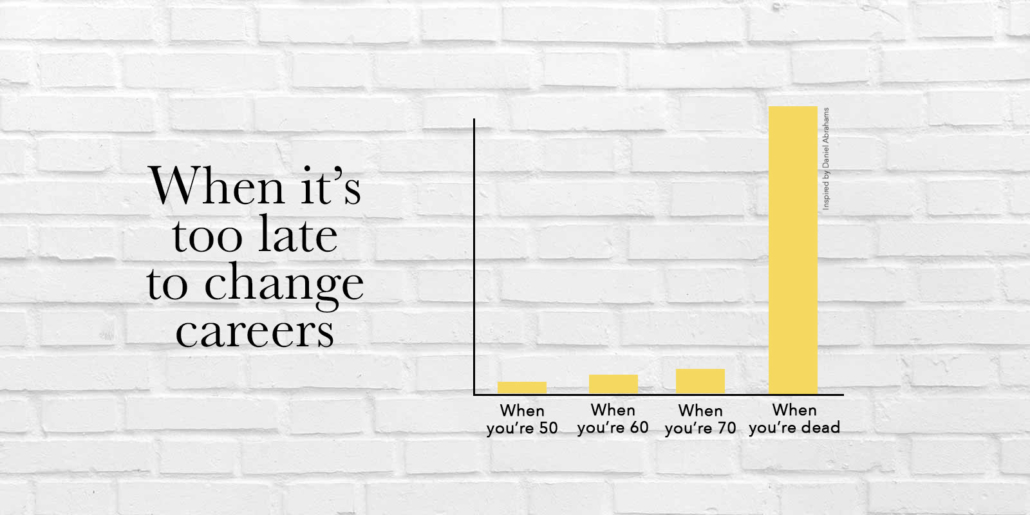“In the first half of life, ambitious strivers embrace a simple formula for success in work and life: focus single-mindedly, work tirelessly, sacrifice personally, and climb the ladder relentlessly.
It works. Until it doesn’t.” says bestselling author and columnist behind The Atlantic’s popular “How to Build a Life” series, Arthur C. Brooks.
The momentum that drive you in the first part of adult life fuels your motivation to earn expertise, power, financial success, mastery, leadership, learning, excitement and social acknowledgement. Hard work pays. Challenge makes you grow. Experience makes you hone your skills to excellence. Your peers think highly of you. You belong to a league of successful professionals.
Then something happens. A subtle decline of interest for what you have been doing with drive and perseverance for a couple of decades. A crave for something. The next thing you know, here you are, a corporate leader, a respected expert or a successful entrepreneur, admired and envied by your peers, now questioning the meaning of this story you tell about yourself.
Some will suggest mid-life crisis. The terms, which was coined in the 70’s, evokes a number of clichés, among which a man in his 50’t divorcing his wife to marry a younger woman and buying a red Ferrari. Or a Porsche.
Is that it? Or is there more to it?
Arthur C. Brooks offers a radical, and somewhat controversial explanation in his best seller “From Strength to Strength”. He explains that the first part of adult life is driven by “fluid intelligence”, a resource that make you prone to create, innovate, find new paths and out-of-the-box solutions. This form of intelligence tends to fade away with time, creating a feeling of inadequacy that persists even though you try to ignore it, or work harder to compensate. The second half of adult life favors another resource called the “crystallized intelligence”, a pool of wisdom made of knowledge and experiences, available for you to tap into. This form of intelligence excels at training, sharing, creating human and social bonds and produces work based on cross-fertilizing different corpus of acquired knowledge.
Brook’s message is that this new resource can serve you beautifully to fuel a redesigned purpose.
Accepting a decline in interest and accuracy is difficult. Nothing prepared you to hit this wall at the prime (or so you think) of your professional journey. Avoidance and denial are normal reactions.
Now consider this: How many transitions did you already have in your life? Many. From student to professional. From job to job. From corporate to entrepreneur. From single to partner, to parent, to care-giver for your ageing parents. Some transitions were deliberate, and some just happened. Your transition muscle is trained. You are just not prepared to this one, which is insidious, because it comes from within, sending a message you may not understand, and even less like.
Change is inevitable. If you continue ignoring what your gut feeling is trying to tell you, it will unfold in ways that may not suit you. Some of you will double their efforts to stay in the game at all cost. Some will experience an enduring lack of motivation, or both. The wake-up call may come sideways: Loss of job, decline in performance, feedback from your loved ones who worry for you.
So, what now?
It is time for a reset, a profound, authentic reset, including every stable and moving part in your life. The idea is not necessarily to make big changes. However, some take a giant leap into their new chapter.
The idea is to question and assess with radical honesty your current situation and beliefs, your image of yourself and what you think defines you. It is also an invitation to explore what makes you alive, what you want more of in your life and what you crave. This first step is vastly destabilizing, but extremely rewarding to help you shape your future self.
Resonant choices come next, made possible because you are now deeply connected to your heart and attentive to your inner wisdom. These choices involve that you say NO to beliefs and habits that do not serve you any more, and possibly to a job, or a lifestyle, that served you well but now plays against you. It is also time to say a massive YES to the things that you really care for, relationship, work, personal care, and YES to new avenues of personal and professional development.
Action naturally derives from these choices. Action is inevitable and exciting because it comes from a place of alignment with everything you value most. Fuelled by a renewed energy, you are ready to surprise yourself and others – and live out of your so-called “comfort zone”, which had become obsolete anyway.
You will hear that it is too late anyway to reboot your professional life. Is it?
Let’s say you started working at 28 years old, and you are now 48. Considering that the retirement age is inexorably pushed back in all countries, you may be exactly midway in your career. Don’t wait for the unwanted wake-up call. Take the lead.

 Alexandra Humbel
Alexandra Humbel Alexandra Humbel Coaching
Alexandra Humbel Coaching